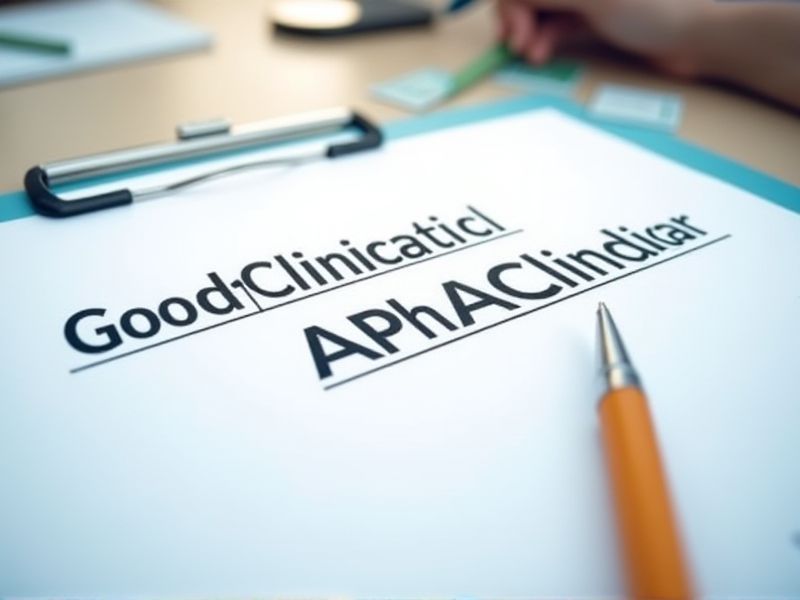
Good Clinical Practices (GCP) Auditors ensure compliance with protocols and regulations in clinical trials, which directly impacts patient safety and data integrity. Obtaining certain certifications provides auditors with specialized knowledge of international guidelines and standards. Certifications validate the auditor's expertise and enhance their credibility, enabling them to identify and mitigate risks effectively. These important certifications may be necessary for someone aspiring to become a proficient Good Clinical Practices Auditor.
Good Clinical Practice (GCP) Certification
GCP Certification ensures that the auditor understands international ethical and scientific quality standards necessary for conducting clinical trials. It provides the auditor with the necessary skills to evaluate whether trials are being conducted in compliance with applicable regulations, protecting participant safety and integrity. Certification enhances the auditor's credibility, giving stakeholders confidence in their ability to perform accurate assessments and identify non-compliance issues. Through certification, auditors can maintain up-to-date knowledge of evolving regulations and guidelines, ensuring continuous improvement in audit processes.
Certified Clinical Research Professional (CCRP)
Certified Clinical Research Professionals (CCRPs) possess a comprehensive understanding of Good Clinical Practices (GCP), ensuring adherence to regulatory standards. Their expertise reduces the risk of non-compliance during audits, which can prevent legal and financial ramifications for research organizations. CCRPs bring a structured approach to auditing, enhancing the integrity and reliability of clinical trial data. Their certification reflects a commitment to continuous education, keeping them updated with evolving regulatory guidelines and best practices.
Certified Clinical Research Auditor (CCRA)
The role of a Certified Clinical Research Auditor (CCRA) ensures compliance with Good Clinical Practices, enhancing the credibility and reliability of clinical trial data. Their expertise identifies deviations and inconsistencies, reducing risks associated with non-compliance in research activities. Having a CCRA involved in trials instills confidence among stakeholders and regulatory bodies in the study's integrity. They play a pivotal role in safeguarding participant safety by ensuring adherence to ethical guidelines and protocols.
Regulatory Affairs Certification (RAC)
Obtaining a Regulatory Affairs Certification (RAC) enhances a Good Clinical Practices (GCP) Auditor's understanding of global regulatory requirements, which is crucial for ensuring compliance during clinical trials. The certification validates an auditor's expertise in navigating complex regulatory landscapes, improving their credibility and reliability in the field. Expertise gained through RAC helps auditors identify potential compliance issues, reducing the risk of regulatory setbacks or penalties. This certification ensures that auditors are up-to-date with current regulatory expectations, enabling more accurate and effective audits.
ISO 9001 Lead Auditor Certification
Obtaining ISO 9001 Lead Auditor Certification enhances the auditor's understanding of quality management systems, which directly strengthens audits in clinical settings. A certified lead auditor is better equipped to consistently apply Good Clinical Practices (GCP) standards, ensuring compliance and quality throughout the clinical study lifecycle. The certification provides essential skills in audit planning, execution, and reporting, which align with the rigorous requirements of GCP audits. Organizations value certified auditors as they contribute to improving clinical trial validity and reliability, translating to better patient outcomes and regulatory acceptance.
Certified Quality Auditor (CQA)
A Certified Quality Auditor (CQA) is vital for a Good Clinical Practices (GCP) auditor because it ensures the auditor has comprehensive knowledge of audit principles. This certification equips auditors with the skills to assess compliance with regulatory standards effectively. GCP audits benefit from the structured approach that CQA training provides, mitigating risks in clinical trials. A CQA-certified auditor contributes to the integrity and reliability of clinical data, safeguarding patient safety and research validity.
Lean Six Sigma Green Belt
Lean Six Sigma Green Belt certification equips Good Clinical Practices (GCP) auditors with the skills to identify inefficiencies and enhance operational processes, resulting in improved quality control. This training emphasizes data-driven decision-making, which helps in analyzing trends and deviations within clinical trials, ensuring compliance with regulatory standards. Familiarity with Lean Six Sigma tools allows auditors to effectively implement corrective measures, thus minimizing errors in clinical practice. The systematic approach of the Green Belt also aids in maintaining consistency and reliability in clinical research documentation and reporting.
Project Management Professional (PMP)
Earning a PMP certification equips a Good Clinical Practices Auditor with structured project management skills, enhancing the planning and execution of complex audit processes. This certification fosters a standardized approach to executing projects, vital for ensuring compliance with regulatory requirements in clinical trials. PMP knowledge helps auditors manage time, resources, and stakeholder communications more effectively, reducing project risks. A PMP helps auditors implement best practices and maintain quality, contributing to reliable and valid clinical trial outcomes.
Certified in Healthcare Compliance (CHC)
A Good Clinical Practices Auditor must ensure compliance with healthcare regulations, and being Certified in Healthcare Compliance (CHC) provides a structured understanding of such regulations. The CHC certification demonstrates an auditor's proficiency in navigating complex legal mandates, which is crucial for safeguarding clinical processes. This qualification also equips auditors with the necessary tools to effectively identify and address compliance deficiencies, promoting ethical practices in clinical research. Organizations benefit from auditors with CHC certification, as it reduces the risk of non-compliance and enhances the integrity of clinical trials.
Risk Management Professional (PMI-RMP)
A Risk Management Professional (PMI-RMP) helps a Good Clinical Practices Auditor identify potential risks that could impact the integrity of clinical trials. This expertise allows them to implement strategies that mitigate risks, ensuring compliance with regulatory standards. The PMI-RMP's skills in risk analysis improve decision-making by providing a systematic approach to evaluating uncertainties. This leads to enhanced safety and efficacy assessment of clinical practices, benefiting overall patient outcomes.
Summary
When you acquire certifications as a Good Clinical Practices Auditor, your professional credibility and trustworthiness in the industry increase. This leads to more robust job opportunities as organizations prioritize hiring certified individuals. Furthermore, your ability to effectively assess and ensure compliance with regulatory standards is enhanced. As a result, you contribute significantly to maintaining the integrity and quality of clinical trials.
